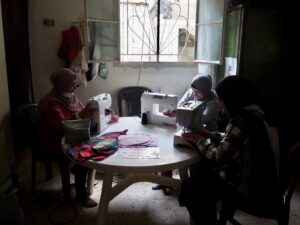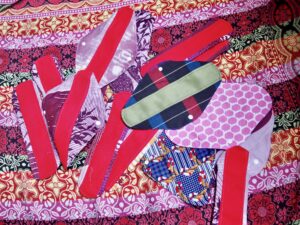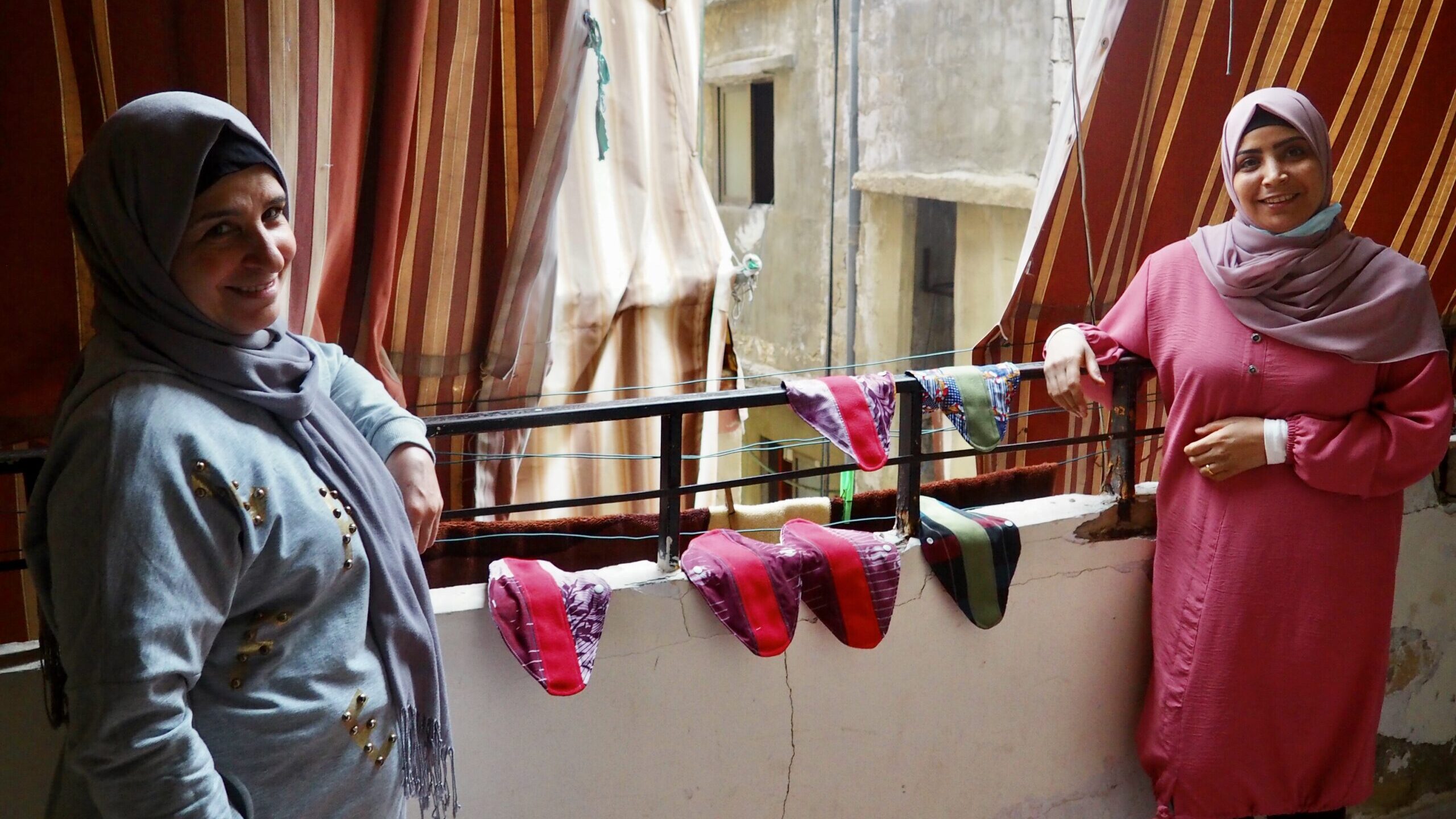Women in Lebanon Find Ways To Tackle Their Own Period Poverty
According to feminist organizations, 76% of women and girls in the Mediterranean country suffer difficulties in accessing menstrual products
(Shatila refugee camp, BEIRUT) Rima, Mariam and Doua meet every afternoon to sew. When the electricity is in service at Rima’s house, the women turn on their sewing machines and get to work. From Shatila, the historic Palestinian refugee camp in Beirut, these Syrian refugees work until dawn making cloth pads. In Lebanon, where 76% of its women and girls have difficulty accessing menstrual products, Rima, Mariam and Doua work to help other women. At the same time, they are mitigating their own period poverty.
“We prevent women from feeling weaker, we make them feel strong and successful,” Doua Ismail said while standing in front of a pile of colorful pads that the nongovernmental organization WingWoman Lebanon will distribute for free. “Around six or seven sanitary pads help her during her menstruation,” Ismail told The Media Line.

Syrian refugee women in the Shatila refugee camp in Lebanon sew pads for other women experiencing “period poverty.” (Andrea López-Tomàs/The Media Line)
A study by the non-governmental organizations Fe-Male and Plan International in August 2021 showed that 41% of Lebanese, Syrian and Palestinian women living in Lebanon have reduced the number of pads they use during menstrual days or have reused the same pad for a longer period of time. As the situation continues to worsen, those days of the month became a nightmare for menstruating women.
Lebanon is experiencing one of the world’s worst economic crises in the last 150 years, according to the World Bank. Prices are skyrocketing and menstrual products, most of which are imported, are following this trend. Currently, a box of pads costs 500% more than before the crisis began in 2019. At that time, it cost around 3,000 Lebanese pounds, equal to about $2 at the official exchange rate. Today, pads are priced from 43,000 pounds to 150,000 pounds, or some $28.70 to $100.
Since menstrual products by virtue of their cost have essentially become a luxury item, many women have been forced to look for alternatives.
“There are women who wash their pads and try to use them again, others are using their children’s diapers or old clothes such as socks and T-shirts, and some use newspapers and paper,” said Line Masri, co-founder of the initiative Dawrati, which means “my menstruation” in Arabic. They have been distributing free menstrual kits for almost three years.
There are women who wash their pads and try to use them again, others are using their children’s diapers or old clothes such as socks and t-shirts, and some use newspapers and paper
These improvised responses have caused negative physical symptoms in women, along with the mental health issues, psychological distress and social anxiety that come with finding themselves unable to afford menstrual products.
“Menstrual poverty affects the dignity of women,” Masri told The Media Line.
Women’s sexual and reproductive health is directly damaged as well.
“It impacts women’s self-confidence in general; how can we empower them and tell them that they can do everything if during four to five days a month, they feel disabled,” Masri said.
Almost half of women and girls in Lebanon, 43% of them, feel anxiety and stress from this, according to the study.
Many choose to stop going to school or to work during those days.
The situation is even worse for at least 25% of the Syrian refugees in the country. More than half of the teenagers in Lebanon who cannot afford to buy pads are part of this vulnerable community.
Period poverty is defined by the United Nations Population Fund (UNFPA) as “the struggle many low-income women and girls face while trying to afford menstrual products.”
But Syrian women also face a walk of a long distance to a private bathroom, none or very little electricity in the camps, lack of a lock on the door of the toilet, and sexual and gender violence.
Forgotten by the Lebanese government, Syrian and Palestinian refugees, alongside local Lebanese women, are forced to turn to NGOs to obtain menstrual products.
In 2020, the Minister of Economy launched a subsidized basket with more than 300 products. But the seven men in charge of the basket did not include pads or any other personal hygiene products related to women. They did, however, include men’s razors.
“NGOs in Lebanon are doing the work of the government, but this is not our job,” Masri told The Media Line.
According to the UN, three out of every four citizens in Lebanon live below the poverty line. The lira keeps plummeting, losing 90% of its value and taking with it the purchasing power of people’s salaries. “Now, people asking for kits are those who used to donate two years ago,” Masri said.
Rima Ali is a Syrian Palestinian refugee who has six children, three of them girls.
“Men don’t think about menstruation nor pregnancy, that is why we, as women, need to help women because we understand ourselves,” Ali told The Media Line. Since she started sewing pads, she can afford to buy food and other necessities. There is still a certain level of shame associated with menstruation and, also, with the work these women are doing. But the taboo does not stop them.

Pads sewn for women experiencing “period poverty.” (Andrea López-Tomàs/The Media Line)
Along the way, they have become more aware of everything related to menstruation.
“When my period comes it messes with my body, I become tired and more irritable,” acknowledged Ali. Ismail agreed: “Men don’t talk about this topic, they don’t think about it.”
“In school, in science class, they dismiss everything related to women’s health,” Ali complained.
“First, we were too shy to talk about it, but now we know it’s something normal, it’s something that comes to us as women,” Ismail told The Media Line.
Especially with the current situation in the country, what we are doing is a success, and we do it for other women
Nine out of every 10 families in Lebanon live in extreme poverty, according to UNHCR-The United Nations Refugee Agency.
“Before WingWoman Lebanon, we were not working because there weren’t any jobs for us,” Mariam Ahmed Abu Qatan told The Media Line. “Especially with the current situation in the country, what we are doing is a success, and we do it for other women.”
“Since we started working, our lives have changed not only because of the money, but because we love the work that we do,” Ismail said. “My life is now beautiful because I have this job.”
Ahmed Abu Qatan agrees with this sentiment. They are women helping women. Using their fingers and their talent, they are transforming fabrics and threads into life savers.


